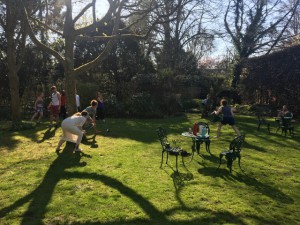A Midsummer Night’s Dream rehearsal diary: Week Two
4 May 2018
‘The Watermill Ensemble encourages everyone in the company to be daringly experimental and think outside the box’
Assistant Director Robert Kirby updates us on what has been happening during the second week of rehearsals for A Midsummer Night’s Dream.
After a rehearsal free weekend, the company met back in Bagnor armed with a truckload of factor 50 to fend off the glorious sun that decided to hang out with us for week two. Movement director Tom Jackson Greaves gave the company the rare opportunity to dash out of the rehearsal room and do a session outside. When there wasn’t interference from ducks and dogs or actors making quick dashes through the grounds to make their next entrance for the matinee, Tom focused primarily on exploring the dynamic between Puck and the fairies. Whilst difficult to sum up in words the delicacy of Tom’s exercises and the way in which they led on seamlessly from one another, essentially we began to look at a grandeur vs animalistic nature of the chorus of fairies in relationship to Puck. There is arguably a push and pull type energy between them, and the space outside enabled the company to fully play around with and explore this idea in more depth, placing any discoveries they’d found back in to the rehearsal room in the context of the scene.
I’ve been fascinated by the idea of The Watermill Ensemble and was really interested to see what the room and process would be like. With half of the cast having worked together on Twelfth Night and Romeo and Juliet last year, there seemed to be a playful, gently anarchic and crisp energy which makes the process a very special and exciting one. It encourages everyone in the company (which has a 50:50 gender split) to be daringly experimental and think outside the box. I’ve no doubt that, as a result of this process, the show will be fresh, dynamic and bold.
Week Two also involved a visit from Susan Elkin, a freelance journalist and author who often writes for The Stage. She popped down to observe a rehearsal in order to learn more about the pioneering integrated signing, spearheaded by The Watermill’s Community Associate, Lixi Chivas. For two performances (13th & 16th June), Lixi along with interpreter Ana Becker, will be fully integrated into the show, making it dynamic and accessible. By being in costume alongside the company and through taking on the mannerisms and essence of the characters they are embodying, sign language is brought to the heart of the action, unlike traditional interpreting that takes place to the side of the stage, creating a split focus for audience members.
Having been in the room for rehearsals to interpret for Sophie Stone (playing Hermia), they have a deep understanding of the play and its story and during some rehearsals, have started the translation and integration process. Having Sophie in the company offers the production and the actors further choices to play with. For example, Sophie is able to sign without voice which empowers her, equally, the other three lovers can cut her out of the conversation during the quarrel by turning away from her, meaning she is unable to lip read what is going on, all of which creates a different dynamic between them. Another choice available to us and being explored throughout the process is the extent to which the lovers communicate with each other using sign. There are moments between Hermia and Lysander when they talk in BSL/theatre sign, deepening the intimacy between them and cutting out those characters who are unable to understand what is being said between them. This is in stark contrast to Demetrius, attempting to marry Hermia, who knows no sign language and doesn’t even bother to try, perhaps giving us some further insight into him. It also means that Helena, having been childhood friends with Hermia, uses it at times to offend and to spite her. Throughout the process, Sophie has translated lyrics to our songs into BSL, and this is being fused into the choreography of the show by Tom and the company to support the physicality of the piece. It creates something quite special that I’ll leave to you as an audience member to experience when you book to come and see it!
We had a Saturday call, filled up with roast dinners on Sunday and were raring to go for week three.
A Midsummer Night’s Dream is touring the UK in September and October 2019. See the tour dates here.
UK tour supported by The Sheepdrove Trust.
This rehearsal diary was written prior to the first performances of A Midsummer Night’s Dream at The Watermill in 2018.
Principal Sponsor of A Midsummer Night’s Dream at The Watermill


